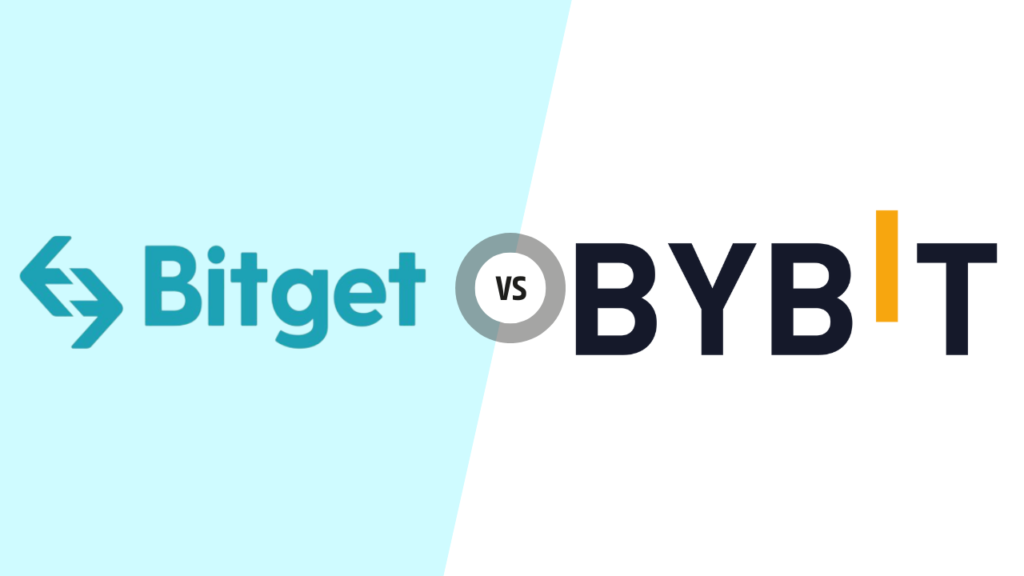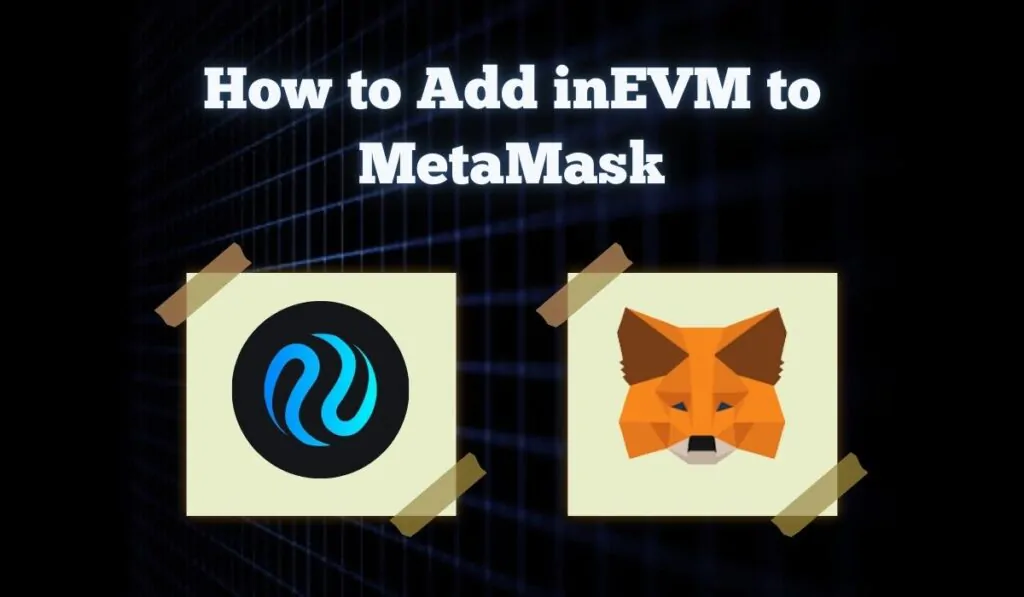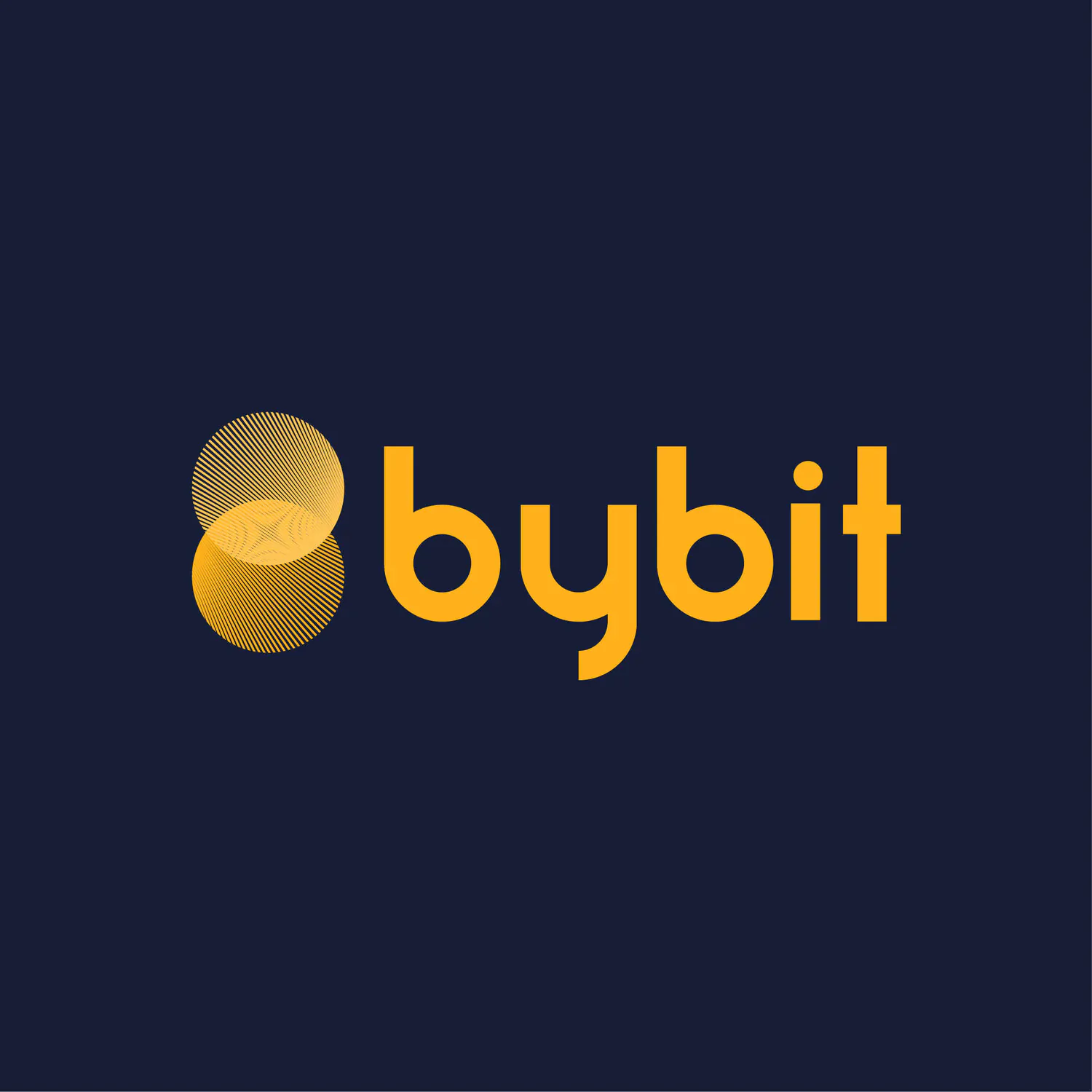Numerous crypto exchanges are operating on the internet, where ByBit and Bitget emerge as the leading platforms. Both exchanges support various crypto coins and have low trading fees. So, which one is better for you?
You might be confused between the (rather) similar features but overlapping benefits. In one case, Bitget seems an excellent option, while in other areas, ByBit shows dominance. We will compare each exchange below to clear up your confusion and help you decide better.
In this comparison, you will learn how they differ in fees, deposit & withdrawal methods, trading features, security concerns, and many other factors. By the end of reading the article, you’ll have a clear answer about which is best for you.
Bitget vs Bybit Quick Overview
Bitget vs Bybit Fees
The first thing everyone will cater to is the fee structure of both platforms. Fortunately, ByBit and Bitget almost share the same fee structure, which is pretty identical for non-verified or level zero VIP users. However, you will observe a slight difference as you increase your VIP or KYC level. Below is the breakdown for spot and futures trading fees.
Spot
ByBit has a maker and taker fee of 0.1% for spot trading. The fee is for non-VIP users, whereas it decreases as your VIP level increases. Only at VIP 1 your maker fee reduces to 0.04%, while the taker fee becomes 0.06%. But at VIP Supreme Level (no. 6), the taker fee is 0.02%, and the maker fee is 0.005%.
The VIP level increases based on factors like BIT (native token) holding, asset balance, and your previous 30-day trading volume. You can enter these levels by trading more than $1 million monthly. Below you will find an image displaying all Bybit fees

Bitget also has the same spot trading maker/taker fee of 0.1% for non-VIP users. But if you increase its level to VIP 5 (max), the maker fee reduces to 0.01%, while the taker fee becomes 0.04%. However, if you are trading in Bitget native token (BGB), you can get an additional 20% discount. Hence, even at VIP 0, your spot trading fee will be 0.08%.
Futures
Futures and perpetual contracts trading fee at ByBit is relatively low. You can enjoy a 0.02% maker fee and a 0.055% taker fee at a non-VIP level. But by increasing the level to its max (VIP Supreme), the taker fee decreases to 0.03%, while the maker fee becomes 0% (free). Remember, you will need to achieve a trading volume of more than $10 a month to become a Supreme VIP customer.
On the other hand, Bitget has a futures contract trading fee of 0.02% for makers and 0.06% for takers. But holding BGB tokens discount doesn’t apply to futures like in spot trading, so you have to increase your VIP level to get a reduced fee. As you get to VIP 5, your maker fee becomes 0.0015%, and the taker fee becomes 0.035%.
Remember, to enter the VIP program, you must have a trading volume of more than $10,000,000 within 30 days. You can also enter it by holding worth 50,000 or above assets in USDT in your balance. Moreover, VIP 1 is liable for holding over 100,000 BGB in your Bitget Wallet. Below you will find an image displaying the Futures fees of Bitget.
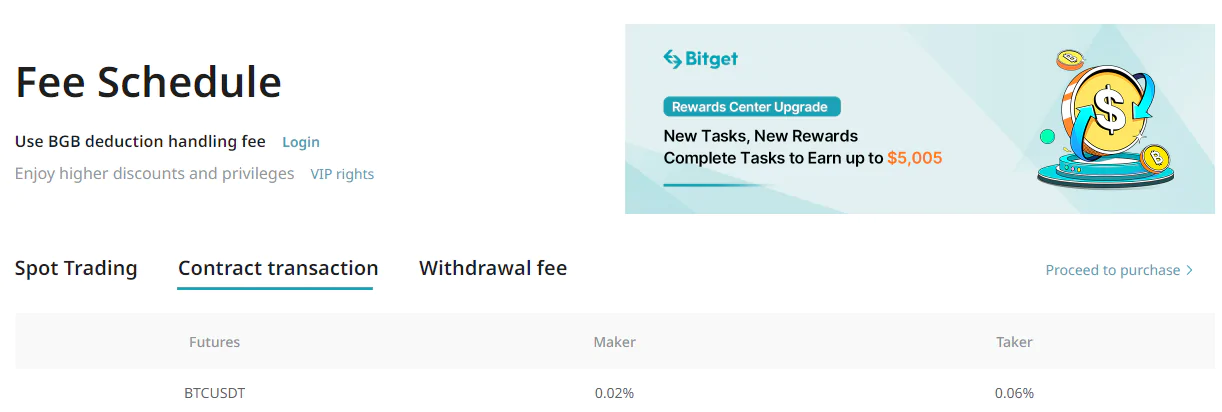
In terms of fees, Bybit offers slightly better value for money. The difference is just small with a 0.01% maker fee difference.
Bitget vs Bybit Deposit Fiat Onramp Methods
Fiat deposit methods are vital while considering any crypto exchange since you must deposit your fiat to the exchange’s wallet for convenience. Some crypto exchanges don’t allow you to deposit fiat, complicating crypto purchasing.
Moreover, it also matters how easily you convert your fiat to any desired crypto coin (onramp). So, below we’ll discuss the deposit and onramp methods on ByBit and Bitget.
Credit Card
Both platforms support credit card purchases to deposit funds or buy crypto. Talking about ByBit, the exchange offers you to deposit fiat via multiple channels depending on the currency you are depositing. Currently, you can deposit 12 currencies, including USD, EUR, GBP, RUB, ARS, MXN, etc.
Each currency has different minimum and maximum deposit limits based on your selected channel. You can deposit some currencies via your credit card, while others are only allowed via third-party platforms. However, you can easily use these currencies to buy crypto coins through a credit card from the one-click buy section.
On Bitget, you have a much broader range of supported fiat currencies to buy cryptocurrencies. Again, the maximum and minimum limit depends on the fiat you’ve selected (from the 100+ currencies option). But you can buy only BTC, USDT, and BGB via fiat currencies by adding a credit card. In the case of depositing fiat, you can only deposit EUR, GBP, and BRL via bank deposits.
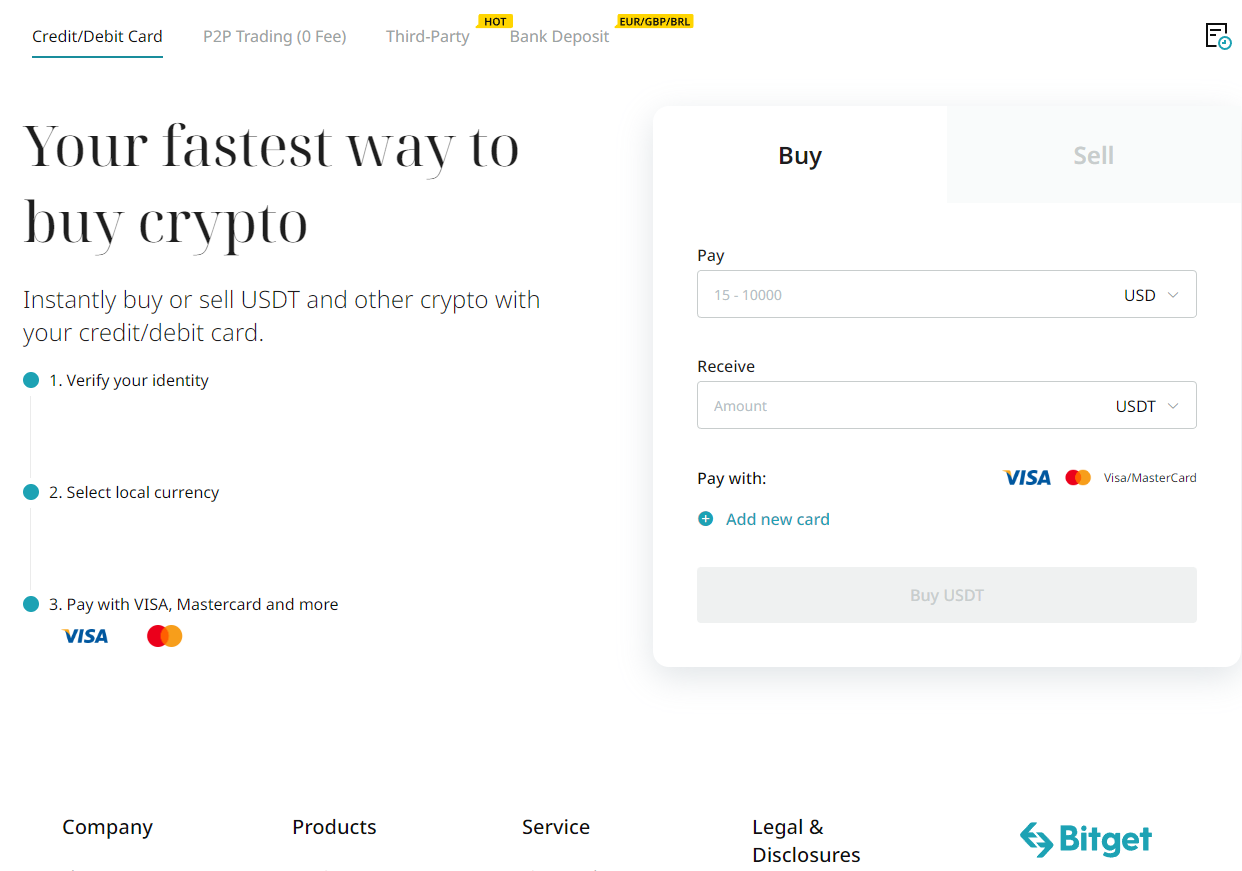
Bank Transfers
Continuing the bank transfer method of Bitget, you can deposit and withdraw fiat only in three currencies, i.e., Great Britain Pound (GBP), European Euros (EUR), and Brazilian Real (BRL). The platform allows you to deposit these currencies via different platforms.
You can deposit EUR through SEPA, which doesn’t charge any fee and require 2 business days. However, your fund will be deposited within minutes if you choose SEPA Instant. GBP depositions are performed through Faster Payments, which is also free, and transfer funds almost immediately. Lastly, BRL deposits use bank transfers through PIX. It also charges 0% fees and requires hardly 15 minutes.
On ByBit, you get the bank transfer option on fewer fiat currencies, including ARS, BRL, EUR, GBP, MXN, PLN, RUB, and TRY. Many currencies use Easy Bank Payments, while RUB requires Local Bank Card. You can deposit fiat in BRL via PIX, MXN via SPEI, and TRY via VakıfBank. Rest fiats are usually depositable via AdvCash Wallet.
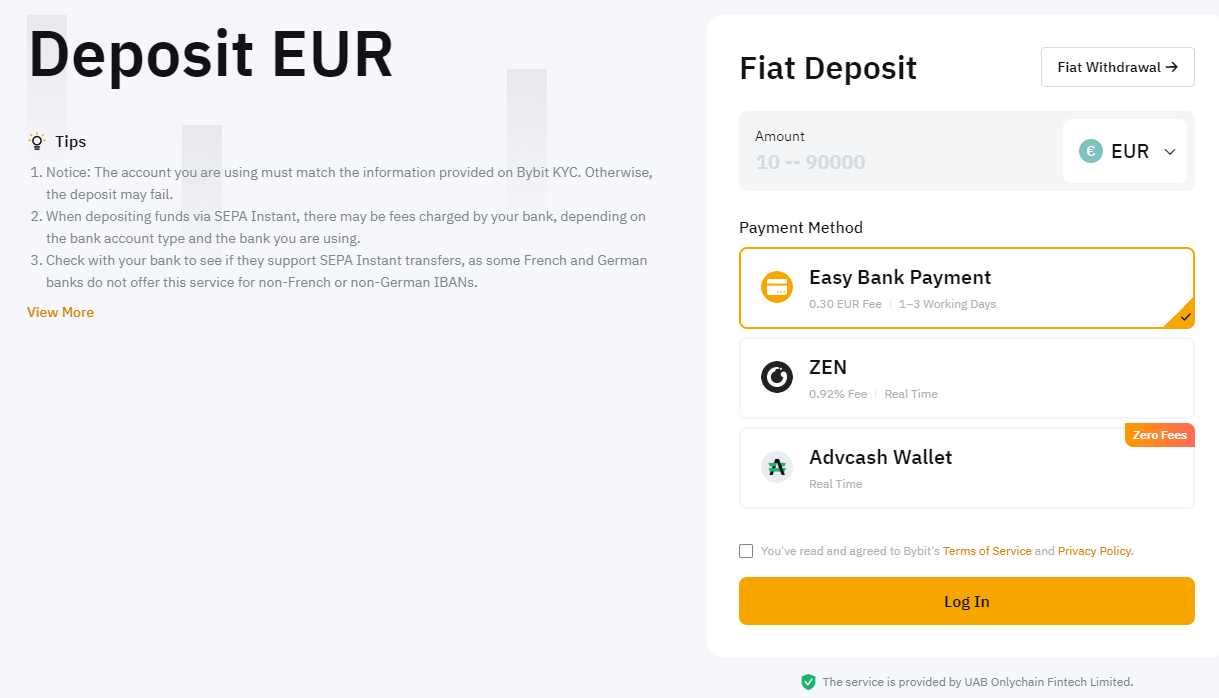
Peer-2-Peer Trading
Peer-to-Peer trading is always a great solution for onramp crypto purchases. You can not only exchange your crypto from a different coin with other platform users but also buy and convert your fiat to crypto. ByBit and Bitget offer amazing P2P trading experiences and have a sufficient user base.
On ByBit, you can buy or sell crypto or fiat by placing ads that are shown to other users. Each ad has a limit for available tokens and the amount one person can get. If you are a trader making a transaction on an already placed ad, you cannot complete the order exceeding that purchase or sell limit. Moreover, the platform offers numerous payment methods, increasing the flexibility and accessibility of the method.
Bitget, on the other hand, also provides free P2P trading. However, the crypto coins supported for P2P trading are limited, i.e., BTC, ETH, USDT, USDC, BGB, and DAI. Fortunately, you get numerous fiat and payment method support. The interesting part is, you can set price alerts where the alarm will tell you about the ads above or below a set price range for selling or buying crypto, respectively.
Third-Party
Third-Party onramp methods are usually expensive. ByBit allows you to buy via third-party on their One-Click Buy section, where you can also buy crypto via credit card or bank transfers. To get third-party involvement, select the fiat currency, its amount, and the crypto coin you want to buy.
Now, click the box under Payment Methods, scroll down a little, and select the channel you want to pay from. Mostly, you can select Google Pay, Maestro, Bank Card, Wire Transfer, or Bank Transfer, but they differ according to your selected currency. Once you click Deposit, you have the third-party options on the next page, which include Banxa, Mercuryo, MoonPay, Legend Trading, Simplex, XanPool, E-Check, and Capitual.
On Bitget, third-party deposits have a separate, dedicated section. You can pay in various fiat currencies but can get only nine crypto coins. You will get different payment methods and 3rd party options for different currencies. Some common ones include VISA, MasterCard, Google Pay, PIX, SEPA, Diner’s Club, and more.
Bitget vs Bybit Withdrawals
Like deposits, you can also withdraw only three fiat currencies on Bitget: GBP, BRL, and EUR. Otherwise, it offers numerous crypto coins to withdraw, where the fees depend on the coin you are taking out.
Moreover, the fees differ for different networks if a coin is available on multiple networks. For instance, the withdrawal fee of USDT on the TRC-20 network is 1 USDT, while ERC-20 is 3.0638816, and Arbitrum One is 0.1 USDT.
ByBit, in contrast, requires you to set up Google Authenticator and verify email to increase a security layer for withdrawals. But it is understandable since you can withdraw various fiat and crypto coins. Fiat withdrawal is almost the same as discussed earlier in Bank Transfer of Fiat Deposit.
Withdrawing crypto is of two types. One is the internal transaction, where you transfer funds from (say) a spot trading account to a futures trading account. While depositing out of the platform falls in On-Chain Withdrawals.
In comparison, Bitget is better at withdrawing crypto but doesn’t offer many fiat withdrawals. Below is a comparison of both exchange’s withdrawal limits:
| ByBit (USDT) | Bitget (USD) | |
|---|---|---|
| Without KYC | 20K Daily (100K Monthly) | 50K Daily (100K Monthly) |
| KYC Level 1 | 1M – 12M | 3M Daily |
| KYC Level 2 | 2M – 12M | 3M Daily |
Remember, while withdrawing your crypto assets to another platform, double-check all the entered information. Failure to select the correct crypto coin or the right network will result in losing all your transferring amount. Also, ensure you have entered the withdrawal address perfectly.
Bitget vs Bybit Features
The core of comparing two platforms is the comparison between their features. So below, we will analyze trading on both exchanges and their standing against each other for different earning potentials.
1. Spot & Futures
Both platforms are great at offering Spot and Futures trading. In fact, both exchanges are considered to have the best trading interfaces in the crypto space! Talking about Spot trading, ByBit and Bitget has the same fees and advantages. However, when you get higher on their VIP level, ByBit seems a better option. At the max level, its fees become half of what Bitget offers, which is 0.005/0.02% maker/taker fee as compared to 0.01/0.04%.
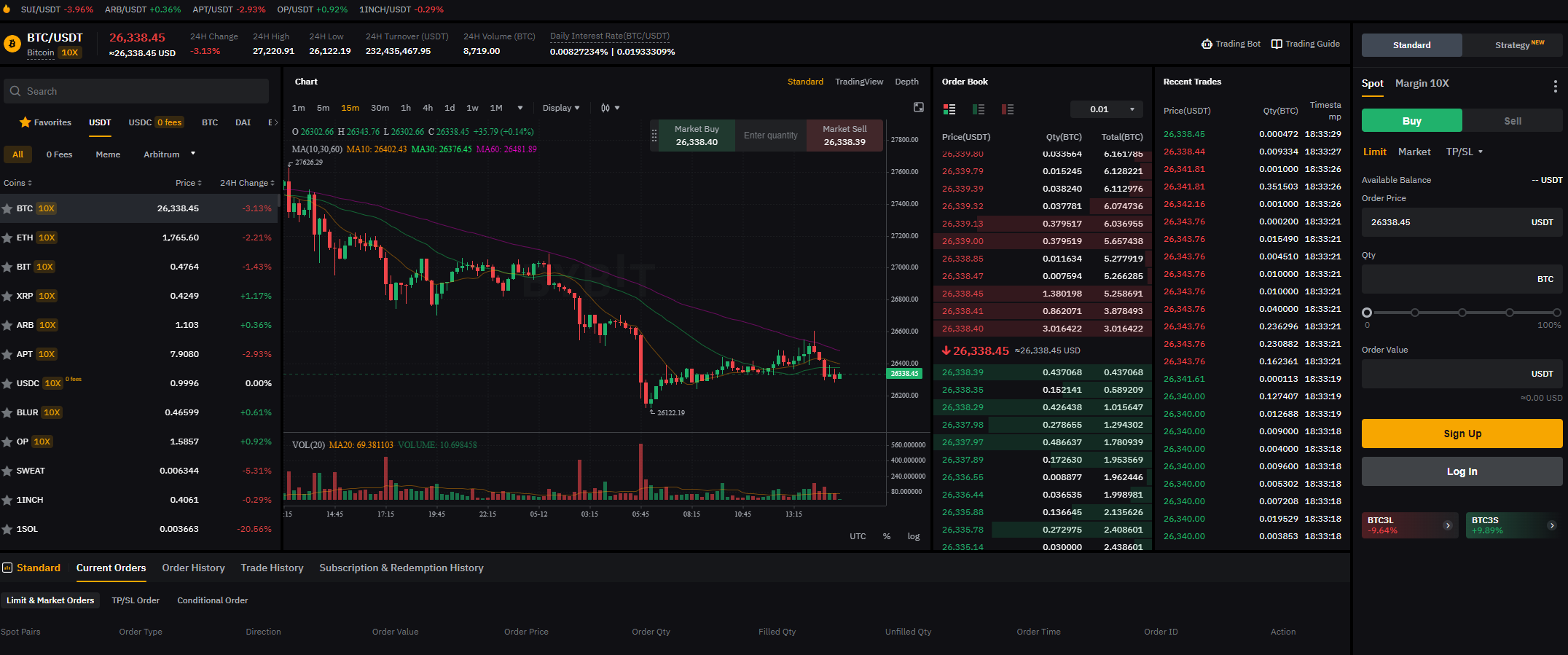
Moving on to Futures trading, Bitget looks dominant and a better choice due to its higher leverage and slightly better performance. The platform offers up to 125x leverage for isolated and cross positions, higher than any other platform. You can also get margins up to 10x in isolated and 3x in spot. However, you will have only up to 100x leverage in ByBit.
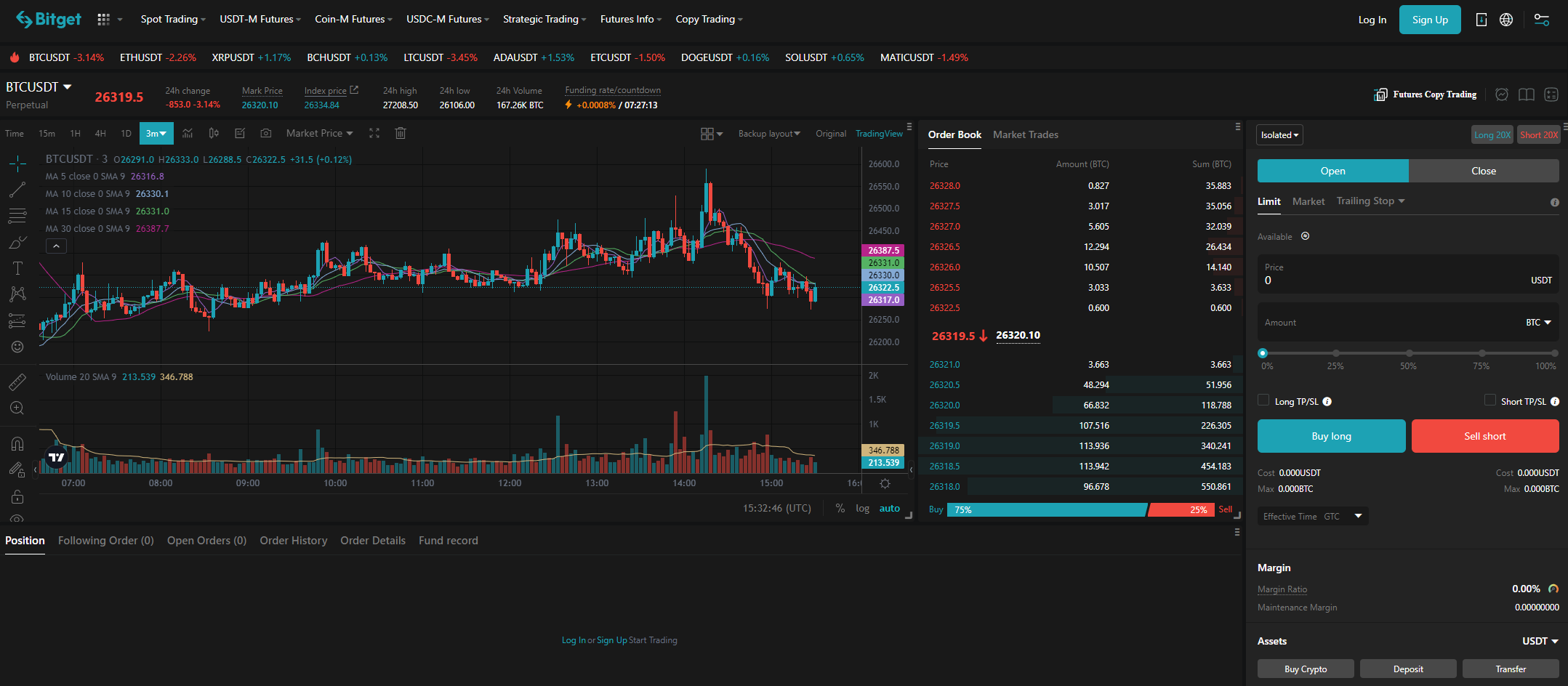
2. Copy Trading
Luckily, both platforms offer copy trading for newcomers to get potential profit while imitating experts. However, Bitget is again a better choice for copy trading. Let’s discuss ByBit first why it is not. ByBit offers copy trading only in Futures, where the expert traders (Masters) implement leverages. Undoubtedly, they are professionals, many with 100% success rates and high ROI, but you cannot copy them for spots.
On Bitget, you can copy expert traders for spot and futures, both. The process is also smooth and straightforward due to its simple user interface. Becoming a Master trader on Bitget is also easy (which is alarming but not a big issue since the trader’s stats will be visible to followers, so no one will lose by following an amateur). Besides, both platforms offer a 10% share of followers’ profit to the masters.
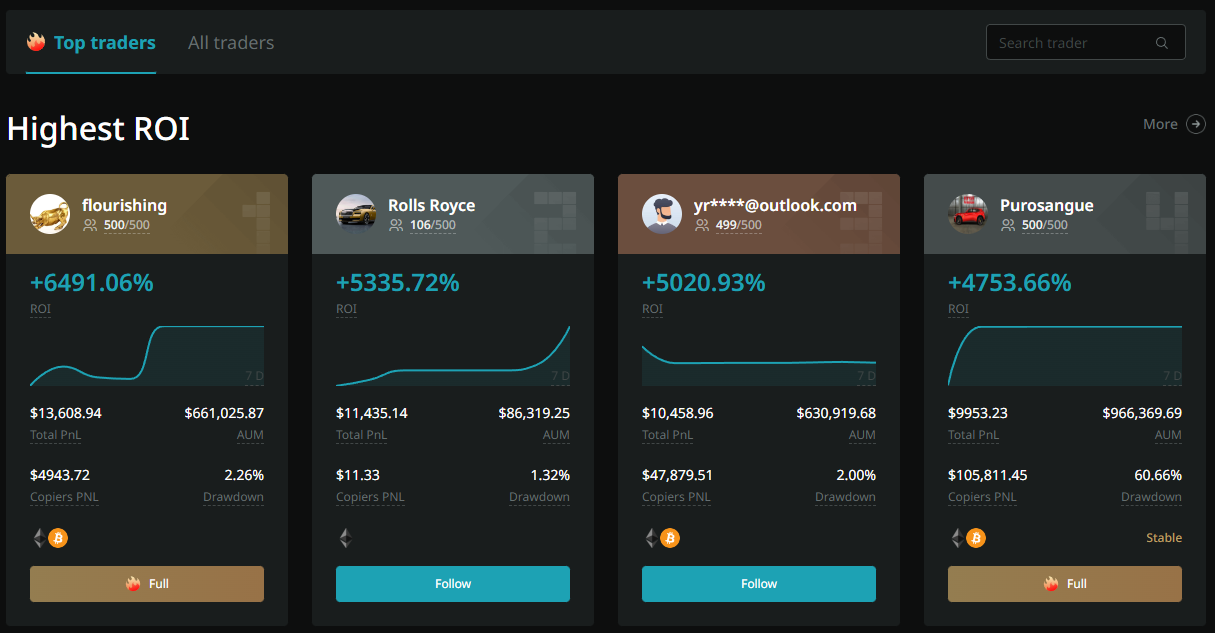
3. Bot Trading
Bot trading is increasingly becoming popular due to lower risks, and both platforms offer trading bots. On Bitget, they are called strategy bot trading, where you integrate strategies (bots) into your trades. These bots are either created by experts or Bitget specialists. However, you can also create your own strategies if you are an experienced trader and let others benefit by charging a minimal fee.
ByBit names these bots as Spot grids or Futures grids, based on your preferred trading format. But it is a better choice since bot trading is free on this platform. The Spot grids have more than 22,500 bots operating, while the Futures grids have over 17,000. Surprisingly, the highest APY these grids have ever achieved has got even above 500,000%, which is astonishing.
4. Earn & Staking
ByBit allows flexible and fixed staking on multiple crypto coins with variable APY. Depending on various factors, these can range from 1.50% to even 680% plus. ByBit Earn offers many products, like ByBit Saving, Liquidity Mining, Lauchpools, Duel Assets, and ETH 2.0. Each product provides a chance to earn a passive income while holding different coins.
On the other hand, Bitget Earn is leading with even more products. It has Bitget Saving, Lauchpool, and Launchpad, where you can stake many crypto coins. Their APY ranges from 1.5% to 300%, depending on the fixed and flexible staking. It also has a dedicated PoS Staking and BGB Staking for better rewards. Moreover, you can benefit from their additional products, like Sharkfin, Duel Investment, Smart Trend, Range Sniper, and more.
5. Payments (Debit Card)
ByBit has a significant advantage over Bitget due to its ByBit Card. It is a MasterCard Debit Card that you can order after completing both KYC verification, verifying your phone number and email address, and enabling two-factor authentication. With the ByBit Card, you can unlock various benefits and perks, and get better rewards.
You can pay worldwide directly from your ByBit account, have multiple staking perks, and redeem numerous exclusive offers. Interestingly, if you have crypto on your account while using your debit card, it will automatically convert into fiat to pay for your shopping. This feature is unavailable on Bitget as the platform doesn’t have its own card.
Bitget vs Bybit Number of Cryptocurrencies
Regarding the crypto coins, Bitget is ahead with more than 450 cryptocurrencies support, while ByBit supports only over 300. Both platforms have popular coins, like BTC, ETH, USDT, ADA, DOGE, SOL, LTC, MATIC, DOT, XRP, and others. But since ByBit is more well-known, you will find better liquidity and easier transactions than Bitget. However, if you wish for a versatile and diversified portfolio, Bitget will be a nicer option.


Bitget vs Bybit Security
No trading platform or crypto exchange is a wise choice if it is not secure. Luckily, ByBit and Bitget are both legitimate platforms with high-security measures. Millions of registered users are trading and staking assets worth billion of dollars. So, let’s take a look at their security measures.
1. Proof of Reserves
Proof of Reserves (PoX) of a platform provides evidence that the user’s data and assets are stored only in that platform’s reserves. Luckily, Bitget and ByBit provide proof of reserves, indicating their legitimacy and transparency.
All information about the user’s assets is presentable on the Merkle Tree, which stores the data in encrypted hashes. Bitget has even provided their Merkle root hash on their website for better transparency.
2. Hack History & Regulations
ByBit is spotless in terms of hack history, as it has never been hacked since its launch. The platform uses sophisticated security measures, storing all the customer’s data and assets in cold storage. Also, it provides various security options on the user’s end, like 2FA, login passwords, and biometric signing in. BVI (British Virgin Islands), a reputable British legal authority, licenses and regulates ByBit.
On the other hand, Bitget suffered a hack in December 2022. The platform’s non-custodial wallet, Bitkeep, was hacked, where hackers stole $8 million worth of crypto coins. But still, Bitget is a safe platform since the hack happened to the wallet. Instead, Bitget Exchange itself is more secure than ByBit as it has 12 A+ SSL Labs ratings. Also, multiple leading authorities of different countries regulate and license Bitget, including FinCEN, FINTRAC, and MSB.
3. Security Funds
ByBit provides security funds in margin trading in case of negative equity. Suppose a person opens a position that closes below the liquidation price, but above the bankruptcy price, the extra margin will transfer to the insurance fund. If someone’s position closes below the bankruptcy price, these funds will be used to make up the liquidity difference.
On the other hand, Bitget has accumulated $300 million in protection funds to protect users’ crypto assets in case of losses. Remember, these funds are only valid if someone loses assets irrespective of their action and due to external circumstances.
4. KYC Requirements
ByBit used to be a non-KYC exchange, but it imposed mandatory KYC verification on May 2023 for all users to operate on the platform. Although you can withdraw funds if unverified, depositing fiat or buying crypto will only be valid to verified users. It may be anxiety to some users, the practice will increase the security of the exchange.
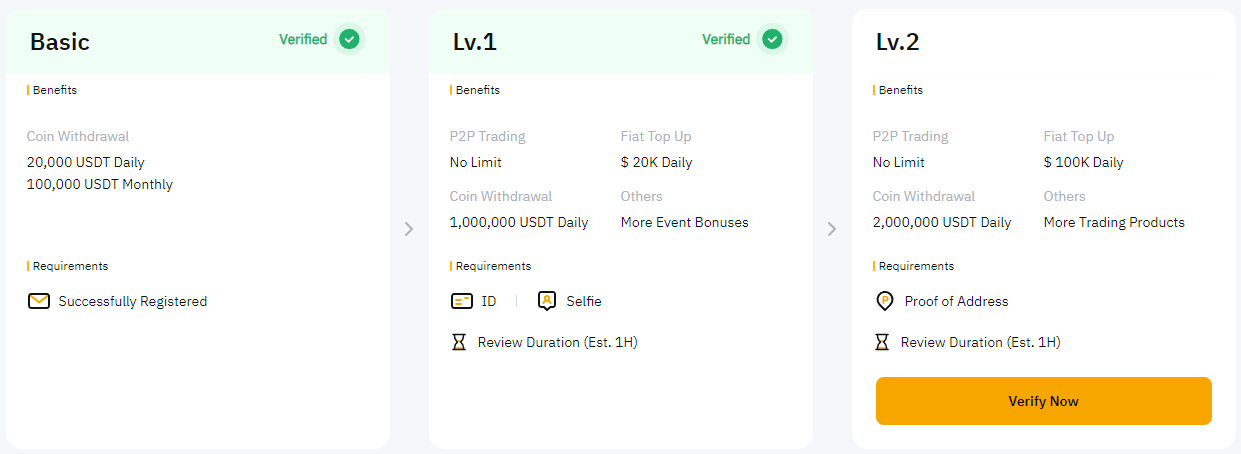
But it also makes Bitget among the best non-KYC crypto exchanges since you can deposit, trade, and withdraw crypto if unverified. However, KYC is mandatory to purchase crypto via card, perform copy trading, or withdraw larger sums of crypto.
5. User’s Device Security
Both platforms are well-equipped with security measures on users’ ends. You can set up login passwords, biometric verifications, and device codes on their mobile applications. Additionally, you can enable 2-factor authentication or bind Google authenticator for increased protection on the website.
ByBit Pros & Cons
| 👍 Bybit Pros | 👎 Bybit Cons |
|---|---|
| ✅ Low spot and futures fees | ❌ Requires KYC |
| ✅ Most advanced trading features | ❌ Slow free demo account |
| ✅ Very user-friendly | ❌ Not available for US residents |
| ✅ Deepest liquidity |
Bitget Pros & Cons
| 👍 Bitget Pros | 👎 Bitget Cons |
|---|---|
| ✅ High leverage up to 125x | ❌ Requires KYC |
| ✅ Vers beginner-friendly | ❌ Not available for US residents |
| ✅ Great Fiat deposits & withdrawals | ❌ Slightly higher trading fees |
| ✅ 550+ supported cryptos |
Bitget vs Bybit: Summary
In conclusion, both ByBit and Bitget are excellent crypto exchanges that offer flexibility, versatility, security, and affordability. You can have diverse trading options, instant transactions, and protected usage.
If you are an active trader who trades heavily every month, ByBit will be a better option due to their reduced fee on VIP levels. Furthermore, Bybit has better liquidity than Bitget as the exchange is bigger and has better market makers. Also, the exchange offers various fiat deposits and withdrawals, increasing usability. However, it requires KYC for many features, and you can only withdraw to a limit if unverified. The supported crypto coins number is decent, but not that much.
On the other hand, if you are looking for versatility and better terms, Bitget will be the right pick. It has higher cryptocurrency support and withdrawal limits and doesn’t even require KYC. But the platform is not well-known as ByBit. Moreover, it doesn’t have the luxury like ByBit Debit Card, which converts your crypto exchange account into (more or less) a bank account.
To summarize it all, ByBit is a great choice for regular traders, but with KYC verification. Bitget is a great choice for non-KYC users and people looking for ease of trading with a diversified portfolio while being anonymous. Briefly, Bitget is flexible, while ByBit is functional and more regulated. Eventually, the decision is all yours to select which exchange suits you the most. We recommend you sign up to Bitget and Bybit to see what suits you best! If you want to learn more about the exchanges, you can check the full review of Bitget and Bybit here!

